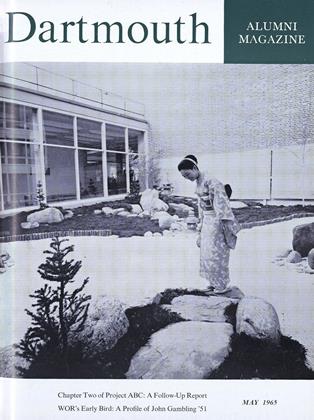By Peter Viertel'41. Garden City, N. Y.,Doubleday &Co., Inc., 1965. 374 pp. $4.95.
Love Lies Bleeding is not the "powerful, haunting novel that lays bare the brutal world of bull fighting-and captures its rare moments of fleeting glory" that the publisher's book - jacket blurb trumpets, but it is still a strong and sensitive piece of writing. The flaw, the almost classic flaw, that haunts this book - that keeps it from accolades proclaiming it a very good or even great novel — is that the author never really decided whose novel this was.
The plot, or storyline for what is related is really not complicated enough to be called plot, is simple enough: an American writer-aficianado returns to Spain to travel the plaza de toros circuit as a companion to his friend, an "aging" bullfighter, experiencing with the torero the agonies besetting the Number One in holding his place against the younger competitors, time, the cruel perversity of human nature, and himself. The same story has been written before (and will be written again and again) about the decline of the Number One's in the arts, sports, politics, etc., - it's a story that is always interesting - but set in the life or death conflict of the bullring under the hot Spanish sun it can be fascinating.
On the surface, and especially in the bullring, the story belongs to the matador, Juan Ramon Vasquez - this is emphasized by the author's dedication of the book to Luis Miguel Dominguin for whom the author obviously has great feelings of affection and admiration. We meet Vasquez just before the matador and his caudrilla are about to embark on another hot summer of daily bullfights - but this time there is a difference, which the American companion immediately senses. Vasquez is physically and mentally tired, his much revered father is dying, and the pressure of the competition from the brave young toreros - and from the fickle public - is beginning to tell. If a reviewer whose only contact with the bullring has been through Hemingway and Barnaby Conrad can judge, author Viertel obviously loves and knows the world of the bullring and the people drawn to it. His accounts of Vasquez's battles with the bulls from the frustrations of his first fight of the season to his second cornada (goring) that ends his season (and perhaps his career) are exciting descriptive writing. Once the reader enters the plaza with Vasquez it's difficult to put down the book until Vasquez has put down, or been put down by, the bull.
Vasquez undoubtedly was meant to be the hero. Yet before the reader meets the matador, Viertel introduces the American, Richard Belden, fearfully coming down out of the skies to join forces with Vasquez. And from that point on the reader travels with Belden, worries with Belden, sees through Belden's eyes - and, even more important, gets to know Belden far better than Vasquez. Vasquez is on exhibit — in the bullring, in his family circle, in the cafe - but the author holds the reader back from getting inside Vasquez, from really learning what makes Vasquez tick. We get observations from others - from several of Vasquez's former mistresses among others - but the revelations are always from the outside. With Belden the reader gets responses first hand. Vasquez is always before the reader, but Belden is upstaging him at every turn.
Nevertheless, let us be content with a fine piece of writing, one that concentrates on character and description for the story's sake - rather than on violence and sex for their own sake.
Literary Editor
 View Full Issue
View Full Issue
More From This Issue
-
 Feature
FeatureCHAPTER TWO OF PROJECT ABC
May 1965 By CHARLES F. DEY '52, -
 Feature
FeatureWOR's Early Bird
May 1965 By HOWARD L. WEINBERG '62 -
 Feature
FeatureALUMNI COLLEGE '65
May 1965 -
 Feature
FeatureJAPANESE GARDEN
May 1965 -
 Article
ArticleWITH THE BIG GREEN TEAMS
May 1965 By ERNIE ROBERTS -
 Class Notes
Class Notes1940
May 1965 By ROBERT W. MACMILLEN, ROBERT H. LAKE
RAYMOND BUCK '52
Books
-
 Books
BooksALUMNI PUBLICATIONS
December 1921 -
 Books
BooksTHESE WERE ACTORS.
January 1956 By BENFIELD PRESSEY -
 Books
BooksPREPOSTEROUS PAPA.
January 1960 By HERBERT F. WEST '22 -
 Books
BooksProf. Herman Feldman
March 1943 By Herbert Wells Hill. -
 Books
BooksCONTRIBUTIONS TO THE GEOLOGY OF URANIUM AND THORIUM:
October 1956 By JOHN B. LYONS -
 Books
BooksTHE OFFENSIVE GOLFER
FEBRUARY 1964 By JOHN HURD '21


